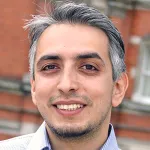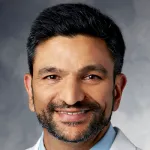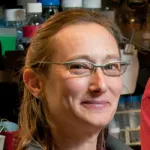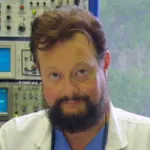Interested applicants to the Bio-X/Novo Nordisk Foundation Visiting Scholar or Visiting Postdoc Fellowship Program should check this page for an ongoing curated list of Bio-X affiliated faculty who have indicated willingness to host and mentor a fellow should he/she get selected for the program. Applicants can also review the entire list of Bio-X affiliated faculty to search for faculty of specific research fields.

Monther Abu-Remaileh - Assistant Professor of Chemical Engineering and (by courtesy) of Genetics and Institute Scholar of ChEM-H
Research projects of interest for fellowship program: Human genetics implicates lysosome dysfunction in a plethora of age-associated neurodegenerative diseases, including frontotemporal dementia, Alzheimer's and Parkinson's disease; however, the exact role of the lysosome in neuronal cell homeostasis and the biochemical bases of the lysosome dysfunction are still enigmatic. To tackle this problem, the Abu-Remaileh Lab takes a systematic approach by mapping the biochemical changes in the lysosome content over the course of the disease using animal models of age-associated neurodegeneration. We will study how the altered levels of metabolites lead to neurotoxicity and disease progression. We will further use this knowledge to engineer therapies that specifically target the affected biochemical pathways in order to treat these incurable diseases.

Vivek Bhalla - Assistant Professor of Medicine (Nephrology)
Research projects of interest for fellowship program: The Bhalla laboratory studies pre-diabetic and diabetic complications that involve the kidney using transgenic and molecular biology approaches. We have expertise in renal physiology and pathophysiology and have specific projects in the following areas: 1) Diabetes-associated glomerular disease, 2) Insulin regulation of diabetes-associated sodium-and-glucose transporter via SGLT2, and 3) Diabetes-associated potassium transport. Visit our lab website at www.bhallalab.stanford.edu.

Eric Appel - Assistant Professor of Materials Science and Engineering
Research projects of interest for fellowship program: The underlying theme of the Appel Lab at Stanford University integrates concepts and approaches from supramolecular chemistry, natural/synthetic materials, and biology. The lab aims to develop supramolecular biomaterials that take advantage of the beautiful synergism between physical properties, aesthetics, and low energy consumption typical of natural systems. The lab’s vision is to use these materials-based technological advancements as tools to better understand fundamental biological processes and to engineer advanced healthcare solutions.

Ovijit Chaudhuri - Assistant Professor of Mechanical Engineering
Research projects of interest for fellowship program: The Chaudhuri group is interested in elucidating cell-extracellular matrix interactions, and the roles of these interactions in mediating cell migration, cell division, stem cell differentiation, and breast cancer progression. Our interests are in both understanding mechanotransduction, or how cells sense mechanical cues, and the biophysics of how cells generate force to drive specific biological processes. Our approach is to use engineered biomaterials for 3D cell culture that allow precise and independent manipulation of mechanical properties.

James Chen - Jauch Professor and Professor of Chemical & Systems Biology and of Developmental Biology and of Chemistry

Xiaoke Chen - Associate Professor of Biology
Research projects of interest for fellowship program: Our lab has recently demonstrated critical roles of the paraventricular nucleus of the thalamus (PVT) in opioid addiction. In vivo and in vitro electrophysiological analysis revealed long-lasting plasticity changes in the PVT and its connecting structures. However, the molecular mechanisms underlying these changes remain poorly understood. Epigenetic regulation of gene expression, including DNA methylation, histone modifications, and chromatin dynamics, is a rapidly growing area of research that has been shown to be a major player in driving lasting and stable changes in transcriptional programs. We are seeking for talented postdoctoral fellows to join a team working for examining examine epigenetic changes in the PVT caused by chronic opioid use, then establish causal link between these epigenetic changes and opioid craving and relapse.

Bianxiao Cui - Associate Professor of Chemistry
Research projects of interest for fellowship program: Cui group research focuses on the nano-bio interface, mechanobiology, and neurobiology. We use quantitative tools that draw from many disciplines, including physics, chemistry, biology, and materials science. We are interested in understanding how cells interact nanostructures and the subsequent mechano-sensing signaling pathways. We are also interested in developing new electrophysiology tools and using light to modulate growth factor signaling in neurons.

Heike Daldrup-Link - Professor of Radiology (General Radiology) and (by courtesy) of Pediatrics (Hematology/Oncology)
Research projects of interest for fellowship program: The Pediatric Molecular Imaging Program (Peds MIPS) investigates the use of nanotechnology for improved cancer diagnoses in children. Our team translates new nanoprobes from basic science discoveries to phase I-III clinical trials: For example, we discovered a new approach for magnetic resonance (MR) imaging of tumor associated macrophages (TAM) with nanoparticles in mouse models and obtained an IND to carry out a first in human clinical trial on imaging TAM in malignant tumors of pediatric patients. By exploiting the FDA-approved iron supplement ferumoxytol “off label” as a contrast agent for pediatric tumors, we introduced novel radiation-free whole-body staging tests and designed gadolinium-free PET/MR technologies with 80% reduced radiation exposure compared to current clinical standards.

Reinhold Dauskardt - Ruth G. and William K. Bowes Professor in the School of Engineering and Professor of Materials Science & Engineering and (by courtesy) of Mechanical Engineering and of Surgery
Research projects of interest for fellowship program: e-Wear technologies present new opportunities for connecting our digital and physical worlds. Wearable circuits, sensors and communication devices will change our relationship to our information environment and to each other. However, significant challenges and physiological implications exist for interfacing devices intimately with human skin. The Dauskardt lab studies the barrier and biomechanical function of human skin important for e-Wear devices. By focusing on the outer layer of skin, the stratum corneum, we are able to draw remarkable conclusions about the essential “seam” between our body and the outside world. This includes cosmetic aspects of feel, firmness, skin appearance and even sensory perception. It is important for understanding the implications of the adhesive contact of e-Wear devices with skin, the potential for disruption of the SC barrier and related irritation potential, and for transdermal drug delivery.

Giulio De Leo - Professor of Biology and Senior Fellow at the Woods Institute for the Environment
Research projects of interest for fellowship program: The De Leo group is interested in elucidating cell-extracellular matrix interactions, and the roles of these interactions in mediating cell migration, cell division, stem cell differentiation, and breast cancer progression. Our interests are in both understanding mechanotransduction, or how cells sense mechanical cues, and the biophysics of how cells generate force to drive specific biological processes. Our approach is to use engineered biomaterials for 3D cell culture that allow precise and independent manipulation of mechanical properties.

Maximilian Diehn - Associate Professor of Radiation Oncology
Research projects of interest for fellowship program: The Diehn Lab's research focuses on the development and application of novel liquid biopsy approaches for detection and monitoring of cancers. We have a particular emphasis on analysis of circulating nucleic acids and there are opportunities for both wet lab and computational projects. Areas of particular interest include early detection, minimal residual disease, and predicting response/resistance to immunotherapy and targeted anti-cancer agents.

Ron Dror - Associate Professor of Computer Science and (by courtesy) of Molecular and Cellular Physiology and of Structural Biology
Research projects of interest for fellowship program: The Dror Lab's research focuses on computational structural biology. The lab is a highly multidisciplinary one whose work spans fields ranging from biochemistry, cell biology, and drug discovery to high-performance computing and machine learning. We study the structure and dynamics of biomolecules in order to develop better medicines and quantitatively explain the workings of living systems. Areas of interest range include molecular dynamics simulations, G-protein-coupled-receptor (GPCR) signaling, protein-protein and protein-drug interactions, and cryoelectron microscopy. We collaborate very closely with a wide variety of world-class experimentalists. Learn more through the Dror Lab website!

Shirit Einav - Associate Professor of Medicine (Infectious Diseases) and of Microbiology and Immunology
Research projects of interest for fellowship program: The goal of the project, "Understanding the pathogenesis of flaviviral infections via an integrative systems immunology single cell approach", is to elucidate the cellular and molecular factors contributing to increased severity of dengue and Zika disease in distinct patient populations (newborns, children, adults, pregnant women). To achieve this goal, we are advancing and utilizing various single-cell immunological approaches (virus-inclusive single cell RNA-seq, CyTOF etc) and samples from our Colombia dengue and Zika cohorts. We are mapping an atlas of viral immune cellular targets and studying critical protective and pathogenic elements of the host response to these viruses in multiple distinct infected and bystander cell subtypes with an unprecedented resolution. The translational goals of this project are to identify candidate biomarkers associated with infection outcome and candidate targets for antiviral therapy, as well as improve vaccine strategies.

Judith Frydman - Donald Kennedy Chair in the School of Humanities & Sciences and Professor of Genetics
Research projects of interest for fellowship program: The Frydman lab runs a very exciting research program that aims to defime the mechanisms and pathways of cellular proteistasis, i.e. protein folding, protein quality control and protein aggregation. We use a combination of structural, biophysical, cell biological and genetic approaches. Our work ranges from addressing basic questions of protein folding and quality control, to investigation of proteostasis disfunction during aging, neurodegeneration and cancer.

K. Christopher Garcia - Younger Family Professor and Professor of Structural Biology
Research projects of interest for fellowship program: Our laboratory is broadly interested in cell surface receptors and their ligands. Our principal goal is to exploit mechanistic and structural information on receptor-ligand interactions to interrogate and therapeutically impact human disease. We ask how ligand recognition and signaling coordinate with the physiology of the cell using protein engineering to manipulate signaling pathways in order to control cell function and fate. The receptor systems we study play key roles in immunology, stem cell and neurobiology, and have translational relevance to immunotherapy and regenerative medicine. The postdoc would focus on engineering receptor-ligand interactions in the immunotherapy space. Check out the lab website here.

Andrew Gentles - Assistant Professor (Research) of Medicine (BMIR) and, by courtesy, of Biomedical Data Science
Research projects of interest for fellowship program: Our interests are in computational systems biology of cancer, particularly the integration and analysis of different types of data, such as genomic data and clinical outcomes. Much of our recent work has been concerned with the influence of immune infiltrates on outcome in various cancers, as well as the influence of sub-populations such as cancer stem cells.

Jeffrey S. Glenn - Professor of Medicine (Gastroenterology and Hepatology) and of Microbiology and Immunology
Research projects of interest for fellowship program: In the Glenn lab, we seek to develop novel types of antiviral and anti-cancer strategies for the clinic with high barriers to resistance, as well as engineered human liver tissues. Potential projects can include: 1) Development of a universal therapeutic against influenza (RNA biology and virology); 2) Potent small molecule inhibitors of enteroviruses to treat acute flaccid paralysis and rhinovirus-induced asthma (medicinal chemistry and virology); 3) Optimizing a new class of anti-cancer agents (for glioblastoma, hepatocellular carcinoma, lung cancer, and breast cancer); 4) Rescuing hepatic failure with 3D-printed engineered human liver tissues (engineering and transplantation).

Tamar Green - Assistant Professor of Psychiatry and Behavioral Sciences (Interdisciplinary Brain Sciences)
Research projects of interest for fellowship program: The Green Lab's research focus is clinical neuroscience, specifically human genetic models for attention hyperactive deficiency disorder. The Lab has currently have already collected multi-modal imaging data from children with a genetic condition (Noonan syndrome) and controls. A good fit would be a student who is interested in clinical aspects of neuroscience and is interested to use advanced computational models on imaging data.

Brooke Howitt - Assistant Professor of Pathology
Research projects of interest for fellowship program: The diagnosis and prognostication of gynecologic tumors can be challenging from a clinical perspective. My research focuses on molecular characteristics of gynecologic tumors and their precursor lesions. Specifically we are working on 1) developing robust classifiers for accurate and reproducible diagnosis and prognostication based on molecular profiles, including epigenetic changes; and 2) evaluation tumors, precursor lesions, and their non-neoplastic cell origins at the single cell level.

Michael Howitt - Assistant Professor of Pathology (Research)
Research projects of interest for fellowship program: Our lab studies how an intestinal taste cell, called tuft cells, communicates with neighboring neurons and immune cells to control gut physiology. I am interested in several projects related to i) developing a system using electrophysiology to study intestinal tuft cell-nerve-immune cell cross-talk. ii) The use single-cell ATAC-Seq to map differentiation pathways that control the development of heterogenous subtypes of tuft cells during inflammation.

Kerwyn KC Huang - Professor of Bioengineering and of Microbiology and Immunology
Research projects of interest for fellowship program: Gut microbes are fundamentally connected to human health, yet mechanistic understanding of gut microbiota ecology has been hampered by limited throughput and the fact that key parameters often cannot be precisely tuned in animal models. In vitro culturing systems are a complementary approach that affords better control of environmental parameters as well as increased throughput. Synthetic communities generated in bottom-up approaches generally lack the complexity of gut microbiotas, and their members do not necessarily share the evolutionary history of co-habiting microbes within their hosts. We have shown that fecal-derived communities reproduce the composition of their inocula and can be largely reconstituted from isolates. Moreover, for treatment of the same microbiota in vivo and in vitro with ciprofloxacin, in vitro experiments can successfully recapitulate changes observed during in vivo treatment. Future postdoctoral projects can involve studying the assembly dynamics of these communities and how they respond to external perturbations, using a combination of genomics, imaging, computational modeling, and genetics.

Peter K. Jackson - Professor of Microbiology & Immunology and of Pathology
Research projects of interest for fellowship program: Our recent work (Cell 179: 1289) demonstrates that primary cilia are essential for the production of new adipocytes and expansion of adult fat tissue. We discovered that the ciliary GPCR FAR4/GPR120, the receptor for omega-3 fatty acids, is essential to drive cAMP-dependent adipogenesis and receptor agonists can replace cAMP increasing agents to synergize with insulin to drive preadipocytes to change fate and differentiate. We have identified both key cAMP effectors ( including EPAC2) and amplification mechanisms leading to chromatin rearrangement and fate change. Two recent and soon-to-be -published genome wide screens using both traditional differentiation agents and the omega-3 fatty acid ligand provide a wealth of new regulators, including many post-transcriptional factors driving adipogenesis. We are interested in further pursuing these factors and understanding the translational, protein modification and protein stability mechanisms controlling adipogenesis. A major focus is new factors involved in cAMP control of adipogenesis.

Peter S. Kim - Virginia and D. K. Ludwig Professor of Biochemistry
Research projects of interest for fellowship program: Vaccines are one of the most profound accomplishments of biomedical science. The Kim Lab is interested in devising new strategies to enable vaccine development. We are also working to create vaccines against important infectious agents that have eluded efforts to date, including HIV. Our work involves investigation of antibody-antigen interactions and interrogation of B cell populations.

Craig Levin - Professor of Radiology (Molecular Imaging Program at Stanford/Nuclear Medicine) and (by courtesy) of Physics, of Electrical Engineering, and of Bioengineering
Research projects of interest for fellowship program: Multi-modality imaging of living subjects. The Levin Lab is looking for interested and motivated fellows to participate in the following research activities: 1. Exploring novel concepts in molecular imaging instrumentation, including design, construction, and characterization of new sensors and imaging systems. 2. Studying associated signal processing algorithms and computations, including tomographic image reconstruction, data correction, and machine learning. 3. Translating these novel imaging system technologies into clinical and/or preclinical studies involving the non-invasive characterization and quantification of the molecular pathways of disease.

Jin Billy Li - Assistant Professor of Genetics
Research projects of interest for fellowship program: Dr. Li’s laboratory is primarily interested in RNA editing mediated by ADAR enzymes. His laboratory has made major contributions to the identification and mapping of RNA editing as well the regulation of functions. His current work focuses on two new directions of ADAR RNA editing. One is the major biological function of RNA editing, which is to evade dsRNA sensing to suppress autoimmunity. The other is to harness the endogenous ADAR enzyme for transcriptome engineering, a novel RNA therapy approach that overcomes the barriers of CRISPR-based methods. Both directions lead to therapeutic applications for treating a variety of human diseases such as cancer, autoimmune diseases and rare diseases.

Jonathan Z. Long - Assistant Professor of Pathology
Research projects of interest for fellowship program: There is a growing appreciation that in addition to their classical functions, metabolic tissues such as adipose, liver, and muscle also function as secretory organs. The Long Lab is devising strategies for systematically capturing and interrogating these factors en masse. Our goal is to understand the key molecular mediators of inter-organ communication between metabolic tissues, especially following organismal energy stressors such as fasting, cold exposure, or exercise.

Sharon Long - William C. Steere, Jr. - Pfizer Inc. Professor in Biological Sciences and Professor of Biology and (by courtesy) of Biochemistry
Research projects of interest for fellowship program: We study symbiosis of nitrogen fixing bacteria with legumes. Our new projects will explore signal transduction that controls bacteria during infection of the host. The new work will include molecular genetic studies of bacterial regulatory genes and transcription, together with cell biology to localize regulatory proteins associated with bacterial cell envelope homeostasis. The approaches include genetics, biochemistry, high resolution microscopy and videomicroscopy.

M. Bruce MacIver - Professor (Research) of Anesthesiology (Perioperative and Pain Medicine)
Research projects of interest for fellowship program: Dr. Maciver's laboratory investigates the systems, cellular, synaptic and molecular mechanisms of action of central nervous system drugs; especially barbiturates, opiates, anesthetics and abused inhalants, as well as new experimental drugs. At a systems level, we study humans with behavioral measures, EEG, intracranial and depth electrodes to record brain responses to drugs. At the synaptic and molecular levels, the mechanisms of action for CNS active drugs are studied using electrophysiological recording techniques and selective pharmacological probes to enhance or inhibit specific neurotransmitter circuits. Most of our synaptic level studies use brain slices from rodents to record small membrane currents and drug effects on synapses. Neuronal circuit functions are studied using both freely-moving rodents or brain slice preparations. Many drugs appear to act through a combination of pre- and post-synaptic actions on glutamate and GABA mediated neurotransmission. These effects could explain drug actions causing memory loss (amnesia), altered cognitive function and alteration of consciousness.

Danielle Mai - Assistant Professor of Chemical Engineering
Research projects of interest for fellowship program: The Mai Research Group is engineering biopolymers to develop functional biomaterials and to enhance understanding in soft matter physics. Molecular-scale biopolymer design presents a unique opportunity to rationally design materials based on biomolecular templates. Moreover, biopolymer engineering incorporates the rich functional landscape of biological systems into responsive biomaterials. The Mai Group integrates rational biomolecular design, biological and chemical synthesis, and multi-scale characterization techniques to engineer biopolymers with tunable mechanics, stimuli-responsive behavior, and self-healing properties.

Robbie Majzner - Assistant Professor of Pediatrics (Hematology & Oncology)
Research projects of interest for fellowship program: The Majzner lab focuses on the optimization of CAR T cells for the treatment of solid tumors. Interested post-docs/fellows will work on engineering CAR T cells better able to recognize low amounts of target antigen (to overcome tumor heterogeneity) and to discriminate between healthy and normal tissues. The project will draw on state of the art bioengineering to generate novel CAR T cell constructs with improved efficacy.

Patricia Nguyen - Assistant Professor of Medicine
Research projects of interest for fellowship program: The Nguyen lab conducts translational research lab using human tissue and mouse models. We apply advanced techniques in molecular and cellular biology to evaluate the role of the immune system in the development of cardiovascular disease. We have developed a unique infrastructure to train, support, and promote the careers of junior investigators interested in pursuing careers in translational cardiovascular science.

Lucy O'Brien - Assistant Professor of Molecular and Cellular Physiology
Research projects of interest for fellowship program: The O'Brien Lab has a postdoc position available to investigate the cell dynamics that underlie renewal and remodeling of epithelial organs in vivo. Our goal is to understand real-time behaviors of stem cells and their progeny and how they are influenced by physiological signals and epithelial tissue architecture. Experimental strategies include Drosophila genetic manipulation, live animal imaging, computational image analysis, and modeling.

Daniel Palanker - Director of the Hansen Experimental Physics Laboratory and Professor of Ophthalmology and (by courtesy) of Electrical Engineering
Research projects of interest for fellowship program: The primary focus of the Palanker Lab's research is in interactions of electric field (including light) with biological cells and tissues. In the field of optical imaging, we work on interferometric imaging of neural signals and metabolic activity in cells. Sub-millisecond temporal resolution and sub-nanometer precision of quantitative phase imaging opens the door to optical alternative to traditional electrophysiology, without any exogenous markers. We are developing multiple biological applications of this technology, including the imaging of action potentials in neurons, monitoring neural activity in the retina, metabolic changes in photoreceptors during retinal degeneration, and optical thermometry of single cells. In the domain of electro-neural interfaces, we study the mechanisms of neural stimulation and inhibition, and develop photovoltaic retinal prosthesis for restoration of sight in retinal degeneration.

Russell Poldrack - Albert Ray Lang Professor of Psychology and Professor (by courtesy) of Computer Science
Research projects of interest for fellowship program: The Poldrack lab does basic behavioral and cognitive neuroscience research to understand the neural basis of decision making and executive function. In addition, we are interested in the use of neuroimaging methods to understand the dynamics of human brain connectivity. We also develop tools for data analysis and data sharing, with the goal of making neuroscience research more reproducible and transparent.

Thomas Rando - Professor of Neurology and Neurological Sciences
Research projects of interest for fellowship program: The Rando laboratory focuses on basic mechanisms of stem cell biology, ranging from quiescence to asymmetric cells divisions to cell fate determination. In addition, we focus on mechanisms of stem cell aging and rejuvenation, combining studies of diet, pharmacology, and systemic regulators (via parabiosis) to understand the molecular determinants of cellular age and epigenetic rejuvenation. In addition, there are more translational projects in the laboratory focusing on stem cell therapeutics for traumatic and degenerative conditions. Learn more about the Rando lab through the lab webpage.

Daniel Rubin - Professor of Biomedical Data Science and Radiology (Integrative Biomedical Imaging Informatics at Stanford), of Medicine (Biomedical Informatics Research), and (by courtesy) of Ophthalmology and of Computer Science
Research projects of interest for fellowship program: Dr. Rubin leads the Quantitative Imaging and Artificial Intelligence (QIAI) lab at Stanford. His NIH-funded research program focuses on artificial intelligence in medicine, focusing on leveraging clinical medical records text data and images (radiology, pathology, and ophthalmology) to improve medical decision making. Key contributions include discovering imaging phenotypes in radiology, pathology, and ophthalmology images that identify novel clinical subtypes of disease that help to determine best treatments. The QIAI lab leverages innovative approaches to AI in medicine, including weak learning, multi-modal and multi-task models, and inference on longitudinal medical data. Students of varied background are involved in diverse projects.

Juan Santiago - Professor of Mechanical Engineering
Research projects of interest for fellowship program: The Santiago lab creates new microfluidic systems to accelerate targeted DNA and RNA detection via synthetic nucleic acid enrichment libraries. We use electric fields to increase hybridization rates 15,000 fold while decreasing material amount required by 100x. We want to develop and demonstrate a fully functional system to achieve rapid (45 min) enrichment of order 10,000 genes for pathogen detection from cell-free DNA from blood plasma.

Georgios Skiniotis - Professor of Molecular & Cellular Physiology and of Structural Biology
Research projects of interest for fellowship program: The Skiniotis lab in interested in addressing structural and mechanistic questions related primarily to G protein-coupled receptor (GPCR) signaling. The lab employs various methodologies, including cryoEM, biochemistry and molecular dynamics simulations. Available projects aim to determine signaling mechanisms for various GPCRs and also explore the binding properties of novel ligands to facilitate the next generation of therapeutics with higher efficacy and specificity. In addition, the lab is developing methodologies related to cryoEM structure determination, including characterization of very small proteins, lipid nanodisc reconstitution for examination of membrane proteins, time-resolved cryoEM, and cryoEM-molecular dynamics correlative methods.

Matthew Smuck - Associate Professor of Orthopaedic Surgery
Research projects of interest for fellowship program: Wearable Health Lab - The Smuck lab uses wearable body-sensor-networks to measure functional mobility in musculoskeletal and mobility-limiting disease populations. This work involves advanced signal processing, sensor fusion and biomechanical modelling of movement. We aim to extract pathology-related features of movement to provide objective measures of disease impact and recovery.

William Tarpeh - Assistant Professor of Chemical Engineering and (by courtesy) of Civil & Environmental Engineering
Research projects of interest for fellowship program: Providing clean water and adequate sanitation to 10 billion people by 2050 presents enormous technical challenges to society. To navigate these challenges of scarcity, the Tarpeh Lab develops and evaluates novel approaches to resource recovery from “waste” waters at several synergistic scales: molecular mechanisms of chemical transport and transformation; novel unit processes that increase resource efficiency; and systems-level assessments that identify optimization opportunities. NNF Fellows/Scholars will design biomimetic membranes and adsorbents to enable selective separations for resource-efficient water treatment. Most recently, we have focused on ammonia-selective cation exchange membranes, gas permeable membranes, and ion exchange resins, and are eager to combine the specificity of biological systems with the scalability of engineered systems. Learn more at the Tarpeh Lab website.

Joseph Wu - Director, Stanford Cardiovascular Institute, and Simon H. Stertzer, MD, Professor and Professor of Radiology
Research projects of interest for fellowship program: Joseph C. Wu, MD, PhD is Director of the Stanford Cardiovascular Institute and Simon H. Stertzer, MD, Professor of Medicine and Radiology at the Stanford School of Medicine. The Wu lab works on biological mechanisms of patient-specific and disease-specific induced pluripotent stem cells (iPSCs). The main goals are to (i) understand basic cardiovascular disease mechanisms, (ii) accelerate drug discovery and screening, (iii) develop “clinical trial in a dish” concept, and (iv) implement precision cardiovascular medicine for prevention and treatment of patients.

Ellen Yeh - Assistant Professor of Biochemistry, of Pathology, and of Microbiology & Immunology
Research projects of interest for fellowship program: The Yeh Lab studies the apicoplast, a unique plastid organelle in Plasmodium falciparum parasites that cause malaria. We are particularly focused on unbiased chemical and genetic screens to discover new cell biology and therapeutic targets for this important global health disease. Our work highlights the untapped opportunities in exploring divergent biology in non-model organisms, a theme she plans to expand in her lab by studying ocean algae (malaria's cousins!) and their role in the global ecosystem.
